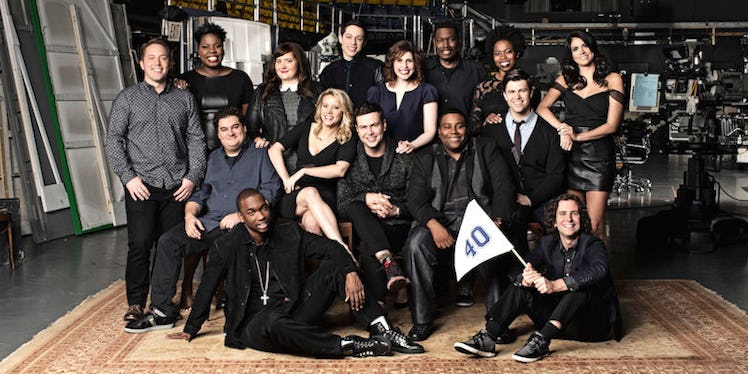"Saturday Night Live’s" three-and-a-half-hour 40th Anniversary special managed to cram the entire history of the show into one night while still keeping the humor fresh and accessible.
Through montages, guest appearances and the rebirth of favorite characters, the “SNL" family celebrated their dynamic, beloved forty seasons that make up the longest-running sketch show on television.
Past all of the gags and performances, however, were the subtle acknowledgments of the show’s flaws.
Critics have long found problems with the show’s lack of diversity and the writers poked fun at the predominantly white male cast in a multitude of ways.
Steve Martin began the show with a typical stand-up monologue, and as per his usual “I’ve hosted this show so many times” joke, he began by saying the best hosts are comedians.
Alec Baldwin and Tom Hanks both popped on stage to challenge this assertion, and as the men quarreled over actors versus comedians, Melissa McCarthy came in as the voice of reason: “What about hosts who aren’t men over 80?”
The gag continued with Chris Rock, asking, “What about hosts who used to be cast members?” subtly answering everyone else’s unspoken question: “What about hosts who aren’t white?”
The writers thus developed the idea that their token diverse cast members should have the forefront in multiple segments, as though it would prove the show’s 40 years did have some cast members who weren’t white and male.
This went past McCarthy and Rock’s brief parts in the monologue, and reappeared throughout the special in a number of ways that both praised the groundbreaking women and minorities in the cast and also apologized for the seasons that didn’t offer the well-deserved spotlight to certain demographics.
The 'Weekend Update' segment, which has been the most widely discussed since the show aired on Sunday night, featured three women.
For the first time in the history of SNL, Jane Curtin, Amy Poehler and Tina Fey delivered the satirical news stories in a triumphant commemoration of their impact on comedy.
Poehler and Fey both wrote in their memoirs ("Yes Please!" and "Bossypants," respectively) and spoke to media sources about some of the sexism women in comedy face.
With Curtin, who was the first-ever female host of 'Update,' Poehler and Fey got the overdue recognition they deserve.
Instead of putting other famous hosts, like Seth Myers, Chevy Chase or Bill Murray, back in the seats, the show allowed some of its most monumental cast members prove, again, that women can be funny.
Finally, the show turned its attention back to comedians of color in Jerry Seinfeld’s monologue. Seinfeld called upon Ellen Cleghorne, a black comedian, who asked, “Why aren’t there more black women?”
She spun the question by clarifying she doesn’t mean black women on "SNL," she just wants there to me more black women “in general,” in order to still be comedic while delivering an important point.
“I’m for having black women everywhere,” Seinfeld said. “Okay, so, how many black women were there on the Seinfeld show?” Cleghorne quipped back.
The joke received roars of laughter, but beneath the comedy, there was an acknowledgment that comedic TV shows in the past gravely misrepresented reality by ignoring entire groups of people.
"SNL 40" was a phenomenal celebration of one of the most monumental shows on television.
The show’s wide range of viewers was able to re-live favorite sketches and reunite with some of the greatest comedians of all time, all at once.
But, the special didn’t serve only as a summary of the show’s history; by poking at the show’s past failure in hiring a diverse cast, "SNL" apologized and acknowledged the importance of women and minorities in comedy.
This provides a great deal of hope for the next forty years of the show, which will surely commence with some all-star new comedians.
